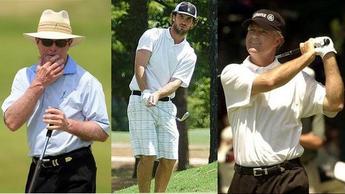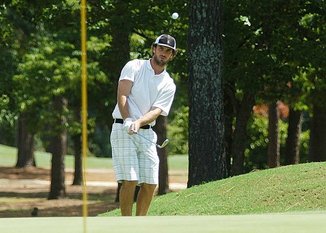 I love amateur golf: everyone is friendly and encouraging, the banter is great when someone in the group hits a good shot, and playing partners talk to each other all day. Amateurs will dwell on how close they came to playing well last round just to convince their playing partners how good they are. Leading up to Q School, Donald Constable sounded a lot like those guys. During U.S. Amateur qualifying, he explained to his playing partner how he had made a few late-round bogeys at the previous week’s Western Amateur to narrowly miss the match play, almost like that was a cool thing. This is common language for most average golfers, a defense against the close calls and disappointments you’re bound to experience if you play this game. Thing is, a pro golfer can’t think like that; to have longevity in this game you have to be in love with yourself. This sounds weird, but when I first began caddying on the Champions Tour for Tom Kite — who is the embodiment of longevity — I thought his insanely positive attitude was insincere. I remember after my first day working for him, I went to dinner with 1993 U.S. Amateur Champion John Harris, who was also playing in the event that week. Harris and Kite are great friends but everyone is different on the grass. Harris asked me, “What is TK like on the golf course?” I said, “John, he is fake out there! Every shot he hits, he tells me how good it is in his squeaky little voice.” This was just Monday, though, and since they only play three-round tournaments on the Champions Tour, we had a long way to go before the gun went off on Friday. But play started Friday and sure enough, Kite missed a 10-foot putt by a foot to the right (sorry, TK) and immediately said, “Man oh man I hit a good putt there!” I had to catch myself a few times thinking he was joking — I have a dry sense of humor, too — but this was no joke. After two rounds of this, Kite hadn’t broken character and sat at 10-under par for the tournament, and I began to seriously reconsider my prior evaluation of him. I said to Harris, “This guy is Mr. Positive all the time and I will say it is not fake one bit.” Still, in the back of my mind I thought, “Well, maybe when the pressure is really on, on Sunday afternoon he will get a little crazy.” A good test came on Sunday’s first hole, when Kite turned to me and asked if it was an 8-iron or 9-iron to the front pin cut over the bunker. “It will fly a little farther out of this rough,” I said, as confidently as I could. “Hit the 9-iron.” The ball plugged under the lip of the front bunker, leading Kite to his first bogey of the week, but he was as unperturbed as ever. “Man, that was a good swing, and so close,” he said.We would have won the tournament that week but Fred Funk putted the best I have ever seen someone putt for three days and beat us. Still, I had learned a valuable lesson about how to approach the game mentally. Constable’s self talk was the first real change we made when we started preparing for Q School, and I think it’s been just as important as all of his short-game improvements. The first true test of this huge attitude change came after Constable’s close call at the U.S. Amateur– I knew that defeat could have been crushing if he let it be. I never heard him tell anyone about the fatal two-stroke penalty he charged himself, but when I heard him tell a close friend simply that he had played well down there and it was a great tournament, I knew he was going to play on the PGA Tour. Now when we get done with a round, Constable rattles off every great shot he hit that day: birdie, long drive or putt, it doesn’t matter. If you keep talking positively, you will start to believe it yourself, after a while.
1 Comment
 Donald’s last event before Q School was the U.S. Amateur at Cherry Hills in Colorado. Donald had been sick and lost 10 pounds in the week leading up to the event, so practice was limited, but I could see in his eyes he was ready to win the thing. We arrived four days early and prepared to be there beyond the 36-hole qualifier and into the match play portion. Donald drew an afternoon tee time the first day at Common Grounds, the off-site course used for the qualifier. We stepped on the tee at 1:30 pm as the second-to-last group, and the wind all of a sudden picked up to 25 mph. The gusts didn’t bother Donald as he shot one of the lowest scores of the afternoon, an even par round of 70. The projected cut overnight was around even-par to plus-1. Donald came out the next day for his early tee time at Cherry Hills and made three birdies early, moving into the top 15. This was the dream start: with the top 64 players moving on to the match play, all we needed to do was maintain, survive and advance. The ball does go far in Colorado, but the 260-yard 8th hole at Cherry Hills is still a serious par-3. Donald hit his tee shot into the bunker and left himself about a 40-yard bunker shot to the pin. As most top players know, this is a tough shot; what made it tougher was a slight lip that Donald had to get over, taking his pitching wedge out of play and forcing him to use his 60-degree. He hit the shot but the club didn’t get through the sand well and the ball stayed in the trap. Out of frustration, Donald hit the sand to see why the ball didn’t come out like he thought, then splashed out of the sand to a couple of feet and two-putted. Donald sensed he had done something wrong in the bunker. On the next hole, he called an official over and explained how he touched the sand with his club on the previous hole. He wanted to make sure he assessed himself the right penalty. I will say, in that situation, it was probably one of the classiest things I have seen in golf. I have caddied a lot for different players on the PGA and Champions Tours, and know from my own experience that we golfers are always trying to bend the rules to our advantage. To Donald, however, pursuing his dream meant doing it with integrity, no matter the outcome. For grounding his club in the sand, Donald assessed himself a two-stroke penalty, carded an 8 on that par-3, and missed the match play by two strokes.  Getting onto the PGA Tour may be a dream, but the focus, dedication, and hours (and hours and hours) of practice it takes to achieve has a way of weeding out the dreamers. In Donald Constable’s case, we needed to take a hard, sober look at his game, beginning with why he ended his college career ranked No. 75 in the country, and not better. We decided to start with his short game — in particular, tightening his putting stroke so that it worked under pressure. I’m the eternal optimist whenever I’m working with a student and so is Donald’s step dad, Joe Ryan, when it comes to Donald’s golf game. Joe and I put together a plan that we thought could work for Donald. Four hours a day, five days a week. We putted — and still do — for hours a day, just focusing on being short and tight, getting the ball started on line. I would say out of the four hours a day, we spent three on Donald’s short game. When we played actual rounds, we always kept score and took it very seriously. We made sure that he never got comfortable with at 73 or 74; that wasn’t going to cut it in the weeks and months to come. Donald immediately started chipping and putting better and scoring lower as a result: leading up to Q School his scores during practice varied from 64 to 70. Once we began traveling to tournaments, we tried to prepare at every course like it was his home course so that he could shoot those low scores consistently. In order to be fully prepared, those practice rounds always need to be harder than the tournament itself. We arrived at each host golf course four days early and played 18 holes every day, with just nine holes the day before the tournament. When he wasn’t on the course, Donald was either eating, sleeping or resting in the Jacuzzi. He was able to keep his pre-tournament practice routine relatively light, because we’d already worked on everything we needed to by the time we arrived on site. When he wasn’t on the golf course, Donald was either eating, sleeping or resting in the Jacuzzi. Skills-wise, Donald was ready, but in golf the mental side of the game is just as important, and after taking our first real trip together I realized that we had probably more work to do off the golf course than on it. We spent a lot of time talking about what he would face regarding pressure and outcome during Q School. I was looking for the same sense of optimism and confidence in his game from Donald that I had seen work for champions like Tom Kite and John Harris. It was Donald’s reaction after one of the classiest, and potentially most devastating, moments I have seen in golf – during the U.S. Amateur qualifier the week before Q School started – that first made me believe he would make the PGA Tour. |
Ernie Rosetop teaching professional and swing coach Archives
May 2013
Categories |
 RSS Feed
RSS Feed